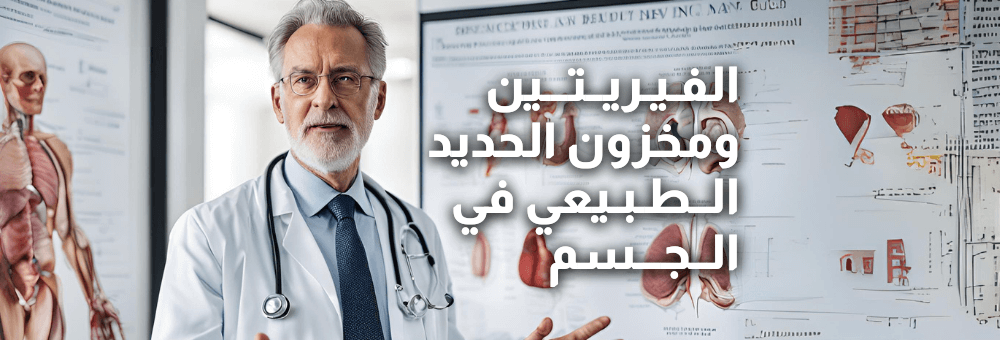Iron plays an important role in maintaining many body functions, including the production of hemoglobin, the molecule in the blood that carries oxygen.
It is also essential for maintaining the health of cells, skin, hair, and nails.
The body stores iron to use for its various functions, and those who suffer from a deficiency in this reserve may face health problems.
What are the causes of this condition, and how can it be dealt with?
How Does the Body Store Iron?
The cells that line the digestive system are responsible for absorbing the iron found in the food a person consumes.
The body absorbs only a small amount of the iron consumed, and then the iron is released into the bloodstream, where it binds to a protein called transferrin before reaching the liver.
Iron is stored in the liver in the form of a substance called "ferritin" and is released as needed to form new red blood cells in the bone marrow.
When red blood cells are no longer able to perform their function after about 120 full circulations per day, they are reabsorbed by the spleen.
The body can recycle iron from these old cells and reuse it.
Causes of Iron Deficiency
Iron deficiency is very common, especially among women and people who follow a low-iron diet.
Iron deficiency in the body appears as a condition known as anemia, and the following individuals are most at risk of developing it:
- Women in their menstrual period, especially those who experience prolonged periods.
- Pregnant or breastfeeding women or those who have recently given birth.
- People who have undergone major surgery or suffered physical trauma.
- People with gastrointestinal diseases such as celiac disease, diarrhea, tropical diseases, or inflammatory bowel diseases like ulcerative colitis or Crohn's disease.
- Vegetarians and others whose diets do not include iron-rich foods.
- People with peptic ulcers.
- People who have undergone obesity surgeries, especially gastric bypass surgeries.
- Children who drink more than 0.5 liters of cow's milk per day, as it reduces iron absorption and irritates the intestinal lining, leading to chronic blood loss.
Other less common causes of iron deficiency include:
- Blood loss from the digestive system due to gastritis, esophagitis, intestinal ulcers, hemorrhoids, vascular dysplasia, and infections such as diverticulitis, or tumors in the esophagus, stomach, small intestine, or colon.
- Blood loss due to chronic nosebleeds.
- Blood loss from the kidneys or bladder.
- Frequent blood donation.
- Hemolysis inside blood vessels, a condition in which red blood cells break down in the bloodstream, releasing iron that is then lost in the urine.
- This sometimes happens in people who engage in intense exercise, particularly running.
If iron deficiency is affecting your daily life, don't neglect your health!
Evercare's IronBoost IV Drip provides you with the necessary dose of iron to boost your health and prevent complications.
Symptoms of Iron Deficiency
Symptoms of anemia caused by iron deficiency are related to reduced oxygen delivery throughout the body and may include:
- Pale or yellowish skin.
- Unexplained fatigue or lack of energy.
- Shortness of breath or chest pain, especially with physical activity.
- Unexplained general weakness.
- Rapid heartbeat.
- Persistent ringing in the ears.
- Headaches, especially with physical activity.
- Brittle nails or hair loss.
Don't let all of this affect you because Energy Boost & Recovery IV Drip will replenish the deficiency in your body.
Strengthening you fully and providing you with the energy and vitality you're looking for.
How is Iron Deficiency Anemia Diagnosed?
Iron deficiency anemia is diagnosed through blood tests, which should include a complete blood count (CBC).
The doctor may request additional tests to assess ferritin levels, iron levels, and total iron-binding capacity.
Results for someone with iron deficiency anemia typically show:
- Low hemoglobin (Hg) and hematocrit (Hct).
- Low mean corpuscular volume (MCV).
- Low ferritin.
- Low iron in the blood (FE).
- Elevated transferrin or total iron-binding capacity (TIBC).
- Low iron saturation.
You can also contact evercare and consult our specialized doctor.
Who will accurately assess your health condition and determine the exact IV Drip Therapy you need to fuel your body with the energy and vitality it deserves.
How Can I Raise My Iron Levels Quickly?
Doctors usually identify the cause of iron deficiency to treat it, but it is still typically necessary to take medical iron supplements until the deficiency is corrected and iron stores in the body are replenished so they can perform their functions quickly.
Most people with iron deficiency need 150 to 200 mg of iron daily.
There are several ways to increase iron stores through diet, including:
- Meats: beef, lamb, especially organ meats like liver.
- Poultry: chicken, turkey, duck, especially liver and dark meats.
- Fish: especially shellfish, sardines, and anchovies.
- Vegetables: broccoli, kale.
- Legumes: peas, beans, black-eyed peas.
- Grains: rice and similar types of grains.
Intravenous vitamins are considered one of the best ways to help treat iron deficiency because they are administered directly into the vein.
Ensuring fast and effective iron absorption makes them the ideal solution for critical cases that need to raise iron levels quickly, such as severe bleeding or chronic malnutrition.
Iron deficiency is a common condition that can be easily treated when diagnosed early.
By following an iron-rich diet, taking supplements when needed, and regularly consulting a doctor, you can restore your health and vitality.
Remember, iron is essential for good health, so don't hesitate to seek help if you suspect a deficiency.

